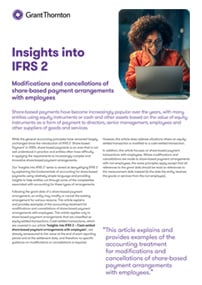-
Financial reporting and accounting advisory services
You trust your external auditor to deliver not only a high-quality, independent audit of your financial statements but to provide a range of support, including assessing material risks, evaluating internal controls and raising awareness around new and amended accounting standards.
-
Accounting Standards for Private Enterprises
Get the clear financial picture you need with the accounting standards team at Doane Grant Thornton LLP. Our experts have extensive experience with private enterprises of all sizes in all industries, an in-depth knowledge of today’s accounting standards, and are directly involved in the standard-setting process.
-
International Financial Reporting Standards
Whether you are already using IFRS or considering a transition to this global framework, Doane Grant Thornton LLP’s accounting standards team is here to help.
-
Accounting Standards for Not-for-Profit Organizations
From small, community organizations to large, national charities, you can count on Doane Grant Thornton LLP’s accounting standards team for in-depth knowledge and trusted advice.
-
Public Sector Accounting Standards
Working for a public-sector organization comes with a unique set of requirements for accounting and financial reporting. Doane Grant Thornton LLP’s accounting standards team has the practical, public-sector experience and in-depth knowledge you need.
-
Tax planning and compliance
Whether you are a private or public organization, your goal is to manage the critical aspects of tax compliance, and achieve the most effective results. At Doane Grant Thornton, we focus on delivering relevant advice, and providing an integrated planning approach to help you fulfill compliance obligations.
-
Research and development and government incentives
Are you developing innovative processes or products, undertaking experimentation or solving technological problems? If so, you may qualify to claim SR&ED tax credits. This Canadian federal government initiative is designed to encourage and support innovation in Canada. Our R&D professionals are a highly-trained, diverse team of practitioners that are engineers, scientists and specialized accountants.
-
Indirect tax
Keeping track of changes and developments in GST/HST, Quebec sales tax and other provincial sales taxes across Canada, can be a full-time job. The consequences for failing to adequately manage your organization’s sales tax obligations can be significant - from assessments, to forgone recoveries and cash flow implications, to customer or reputational risk.
-
US corporate tax
The United States has a very complex and regulated tax environment, that may undergo significant changes. Cross-border tax issues could become even more challenging for Canadian businesses looking for growth and prosperity in the biggest economy in the world.
-
Cross-border personal tax
In an increasingly flexible world, moving across the border may be more viable for Canadians and Americans; however, relocating may also have complex tax implications.
-
International tax
While there is great opportunity for businesses looking to expand globally, organizations are under increasing tax scrutiny. Regardless of your company’s size and level of international involvement—whether you’re working abroad, investing, buying and selling, borrowing or manufacturing—doing business beyond Canada’s borders comes with its fair share of tax risks.
-
Succession & estate planning
Like many private business owners today, you’ve spent your career building and running your business successfully. Now you’re faced with deciding on a successor—a successor who may or may not want your direct involvement and share your vision.
-
Tax Reporting & Advisory
The financial and tax reporting obligations of public markets and global tax authorities take significant resources and investment to manage. This requires calculating global tax provision estimates under US GAAP, IFRS, and other frameworks, and reconciling this reporting with tax compliance obligations.
-
Transfer pricing
Recognized as a leader in the transfer pricing community, our award-winning team can help you expand your business beyond borders with confidence.

-
Transactions
Our transactions group takes a client-centric, integrated approach, focused on helping you make and implement the best financial strategies. We offer meaningful, actionable and holistic advice to allow you to create value, manage risks and seize opportunities. It’s what we do best: help great organizations like yours grow and thrive.
-
Restructuring
We bring a wide range of services to both individuals and businesses – including shareholders, executives, directors, lenders, creditors and other advisors who are dealing with a corporation experiencing financial challenges.
-
Forensics
Market-driven expertise in investigation, dispute resolution and digital forensics
-
Cybersecurity
Viruses. Phishing. Malware infections. Malpractice by employees. Espionage. Data ransom and theft. Fraud. Cybercrime is now a leading risk to all businesses.
-
Consulting
Running a business is challenging and you need advice you can rely on at anytime you need it. Our team dives deep into your issues, looking holistically at your organization to understand your people, processes, and systems needs at the root of your pain points. The intersection of these three things is critical to develop the solutions you need today.
-
Creditor updates
Updates for creditors, limited partners, investors and shareholders.

-
Governance, risk and compliance
Effective, risk management—including governance and regulatory compliance—can lead to tangible, long-term business improvements. And be a source of significant competitive advantage.
-
Internal audit
Organizations thrive when they are constantly innovating, improving or creating new services and products and envisioning new markets and growth opportunities.
-
Certification – SOX
The corporate governance landscape is challenging at the best of times for public companies and their subsidiaries in Canada, the United States and around the world.
-
Third party assurance
Naturally, clients and stakeholders want reassurance that there are appropriate controls and safeguards over the data and processes being used to service their business. It’s critical.

This article explains and provides examples of the accounting treatment for modifications and cancellations of share-based payment arrangements with employees.

Modifications and cancellations of share-based payment
General principle
As we learned in our article, ‘Insights into IFRS 2 – What is IFRS 2?,’ the general principle under IFRS 2 is that an entity must recognize, at a minimum, the value of the services received – measured at the grant date fair value of the equity instruments granted – unless those equity instruments do not vest because of a failure to satisfy a service condition or non-market performance condition that was specified at the grant date. This principle applies regardless of whether there has been a modification or cancellation, meaning that an entity cannot reduce the cost that it recognizes under the original terms or conditions of an award by modifying or cancelling the award.
Modifications
An entity may modify one or more of the terms and conditions of a share-based arrangement, such as the exercise price, number of instruments granted, or vesting conditions. A common modification is when an entity reduces the exercise price of share options in response to a declining share price, because without the reprice the effectiveness of the award as a motivator for employee retention and performance may be lost.
How should modifications be accounted for under IFRS 2?
In addition to recognizing the grant date fair value in accordance with the general principle above, an entity must also recognize the effects of any modifications that increase the total fair value of a share-based payment arrangement or that are otherwise beneficial to the employee.
What types of modifications are beneficial to the employee?
IFRS 2 describes the following types of modifications that are beneficial to the employee:
How should beneficial modifications be accounted for?
The below summarizes the accounting treatment for the types of beneficial modifications outlined in IFRS 2:
Where beneficial modifications give rise to additional amounts to be recognized (i.e., as a result of an increase in fair value or an increase in the number of equity instruments granted), those additional amounts shall be recognized as follows:
- If the modification occurs during the vesting period, recognize the incremental fair value granted over the period from the modification date until the date that the modified equity instruments vest.
- If the modification occurs after the vesting period, recognize the incremental fair value granted immediately, or over the additional vesting period if the employee is required to complete an additional period of service before becoming unconditionally entitled to the modified equity instruments.
How should modifications that are not beneficial to the employee be accounted for?
The below summarizes the accounting treatment for the types of modifications that are not beneficial outlined in IFRS 2:
Multiple modifications
An entity may make multiple modifications to the terms of a share-based payment award that result in the total fair value of the arrangement changing. Some of the changes may be favourable to the employee, while other changes are not (e.g., when an entity reduces the exercise price of a share option award, but also extends the vesting period).
When there are multiple modifications to a share-based payment award, the following are some of the approaches observed in practice for determining whether the modifications are beneficial to the employee:
- Treat the unit of account for the modifications as the total award: consider the net effects of all modifications to determine whether the combined effect is favourable (i.e., where the combined modifications result in an increase to the total fair value of a share-based payment arrangement, the entity would account for the net increase in fair value as a beneficial modification), or
- Treat the unit of account for the modifications as each individual award if the number of equity instruments is reduced but there are other changes such that the total fair value remains the same or increases. If the unit of account is considered to be each individual award, the entity may apply a policy to either:
-
- account for the modification as a cancellation of a portion of the award and an increase in fair value of the remaining awards, or
- consider the net effect of all modifications and account for the changes as a beneficial modification (same outcome as treating the unit of account as the total award).
Modifications that give rise to a change in method of settlement
A modification may also give rise to a change in the method of settlement. For example, an equity-settled award may become cash-settled (or vice versa).
Accounting for changes from equity-settled to cash-settled award
IFRS 2 does not provide guidance on how to account for modifications that result in the classification of an award being changed from equity-settled to cash-settled. However, it does provide illustrative guidance on how to account for an equity-settled award that is subsequently modified to contain a cash alternative. This example can, by analogy, be applied in determining the treatment for a change from an equity-settled to a cash-settled award.
The change in the method of settlement (i.e., from equity-settled to cash-settled, or with a cash alternative added) constitutes a modification if the change was not specified as part of the agreement at the grant date, or if the entity triggers the change (e.g., by changing its past practice of settling in equity to settling in cash instead, when it has a choice of the settlement method).
The general principle of modification accounting continues to be applied, where the entity shall at a minimum, recognize the value of services received measured at the grant date fair value of the original instruments over the original vesting period irrespective of the modification, unless the instruments do not vest because of the failure to satisfy a vesting condition (other than a market condition that was specified at grant date).
At the date of modification, the entity recognizes a liability for the cash alternative at an amount equal to the fair value of the liability at the date of modification, to the extent the specified services have been received. The liability is then remeasured from the date of modification until the date of settlement, with any changes in fair value recognized in profit or loss.
Accounting for changes from cash-settled to equity-settled award
When an entity modifies a share-based payment award such that a cash-settled award becomes classified as an equity-settled award, the entity:
- Measures the equity-settled award at fair value on the modification date, recognizing in equity an amount based on the extent of services that have been received;
- Derecognizes the liability for the cash-settled award at the modification date; and
- Immediately recognizes any difference between the carrying amount of the liability derecognized and the amount of equity recognized on the modification date in profit or loss.
This treatment shall also be applied where an equity instrument is identified as a replacement for a cancelled cash-settled award.
Cancellations and settlements
How should a cancellation be accounted for?
When a share-based payment arrangement is cancelled or settled during the vesting period, an entity accounts for it as an acceleration of any unvested portion of the share-based payment on cancellation – that is, any remaining amount that would have otherwise been recognized over the remainder of the vesting period shall be recognized immediately in profit or loss.
IFRS 2 is unclear on whether the amount that would have otherwise been recognized over the remainder of the vesting period should reflect:
- the maximum number of options that could have vested under the arrangement (e.g., if an entity cancels a share-based payment arrangement whereby it granted 100 options to 100 employees subject to a service condition of three years, the total amount that could have vested is 100 options x 100 employees x grant date fair value of the option, regardless of the number of options that the entity expects will ultimately vest); or
- the number of equity instruments that the entity ultimately expects will vest at the date of cancellation (e.g., if an entity cancels a share-based payment arrangement whereby it granted 100 options to 100 employees subject to a service condition of three years and where it expected that only 80 employees will remain employed at the end of year three, the total amount that is ultimately expected to vest is 100 options x 80 employees x grant date fair value of the options).
In our view, it is appropriate for an entity to make an accounting policy choice to account for cancellations under either one of the two approaches listed above. However, this policy should be applied consistently across all share-based payment arrangements.
How should payments made as compensation for the cancellation of share-based payment arrangements be accounted for?
When an entity compensates employees for the cancellation of an award, it recognizes the unvested portion of the share-based payment immediately as described above. Additionally, the compensation payment is treated as the repurchase of an equity interest and is deducted from equity, except to the extent that the payment exceeds the fair value of the equity instruments granted, measured at the repurchase date. Any such excess is recognized as an expense.
However, if the share-based payment arrangement included liability components, the entity shall remeasure the fair value of the liability at the date of cancellation or settlement. Any payment made to settle the liability component shall be accounted for as an extinguishment of the liability.
How should replacement share-based payment arrangements be accounted for?
An entity may, upon cancelling an existing award, grant new equity instruments to employees. If the entity has designated these new equity instruments – on their grant date – as a replacement award for the cancelled award, the replacement award is accounted for as a modification to the existing agreement as discussed above.
The entity continues to expense amounts relating to the original award over the original vesting period as well as any incremental fair value, calculated as the difference in fair value between the original and replacement awards both measured at the date of modification (i.e., the date the replacement awards are issued). The fair value of the original awards that have been cancelled is their fair value, immediately before cancellation, less the amount of any payment made to the employee on cancellation that is accounted for as a deduction from equity.
If the entity does not determine that the new equity instruments have been granted as a replacement for the cancelled instruments, the new equity instruments are accounted for as a new grant.
Business combinations
In a business combination, the acquirer often issues new share-based payment awards to the acquiree’s employees to replace their existing awards. The accounting for these replacement awards is covered in IFRS 3 ‘Business combinations’ and differs depending on whether the acquirer was obliged to replace the awards or voluntarily chooses to replace the awards.
An acquirer is obliged to replace the awards if the acquiree or its employees have the ability to enforce replacement. This is often as a result of the terms of the acquisition agreement, the terms of the acquiree’s awards, or due to applicable laws or regulations.
How we can help
We hope you find the information in this article helpful in giving you some insight into IFRS 2. If you have a complex scenario or you would like to discuss any of the points raised, please speak to your usual Doane Grant Thornton contact or contact your local office.


